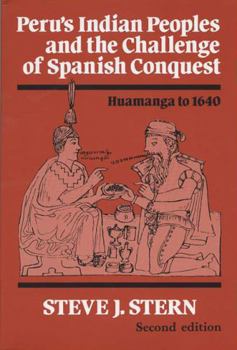Peru's Indian Peoples and the Challenge of Spanish Conquest: Huamanga to 1640
Select Format
Select Condition 
Book Overview
This second edition of Peru's Indian Peoples and the Challenge of Spanish Conquest includes Stern's 1992 reflections on the ten years of historical interpretation that have passed since the book's original publication--setting his analysis of Huamanga in a larger perspective. "This book is a monument to both scholarship and comprehension, comparable in its treatment of the indigenous peoples after the conquest only to that...
Format:Paperback
Language:English
ISBN:0299141845
ISBN13:9780299141844
Release Date:October 1993
Publisher:University of Wisconsin Press
Length:352 Pages
Weight:1.10 lbs.
Dimensions:0.9" x 6.1" x 9.0"
Customer Reviews
1 rating
Andean Indians - Cultural Adaptation to Spanish Colonialism
Published by Thriftbooks.com User , 20 years ago
I was captivated by Mario Vargas Llosa's disturbing novel, Death in the Andes. It is structurally a mystery story, but it can be best characterized as a compelling portrait of political violence in contemporary Peru. Mario Vargas Llosa is a captivating story teller and I found myself wanting to know more about the people that inhabit the harsh mountains of Peru. "Peru's Indian Peoples and the Challenge of Spanish Conquest - Huamanga to 1640" by Steve J. Stern exactly met my needs. This scholarly text tells the story of how conquest transformed a resilient and vigorous people into an inferior caste of Andean Indians. The geographical focus is a mountainous region in southwest Peru dominated by the city Huamanga (today known as Ayacucho, a city not too distant from the fictional town of Naccos, the setting for Death in the Andes). The lengthy title, "Peru's Indian Peoples and the Challenge of Spanish Conquest - Huamanga to 1640", may be a little intimidating, but the book is well-written and is largely accessible without undue effort. The first chapter paints an intriguing view of a pre-Columbian society based on complex reciprocity relationships between members of extended families or kinships called ayllus. These arrangements allowed dispersed groups to exploit isolated, island-like, ecological niches like cold high mountain pastures or low dry valleys while depending upon others for products grown or created elsewhere. The ethnic groups native to Huamanga welcomed the overthrow of the Incas and allied themselves quickly with the victorious Spaniards. "Local communities sacked warehouses once dedicated to the discredited Incas." Chapter 2 examines the rise and subsequent demise of these post-Incaic alliances with the Spanish. Chapter 3, "A Historical Watershed", describes the revival of Andean religious fervor (the Taki Onqoy) and an unsuccessful effort to expel the Spanish colonizers. Remarkably, the Spanish, under the formidable leadership of Don Francisco de Toledo, within a decade had dramatically revised their colonial structure, and largely eliminated any possibility of future revolt by the Andean Indians. Chapter 4 details the political economy of colonialism in the Huamanga region while chapter 5 investigates the contentious legal battles between the Indians and the colonizing elite under the Spanish judicial system. Both chapters are intriguing, but are more difficult for the non-specialist. I was surprised by how carefully the Spanish structured the taxation system; it siphoned away the maximum wealth without completely devastating the Andean economy. The Indians resisted this economic oppression through evasion as well as by tenaciously exploiting the Spanish legal system to protect their rights. The final three chapters explore the ways in which the Andean Indians gradually adapted to Spanish colonization and how this adaptation fostered a political economy of dependence. Stern devotes chapter 7 to the "tragedy of success", th





